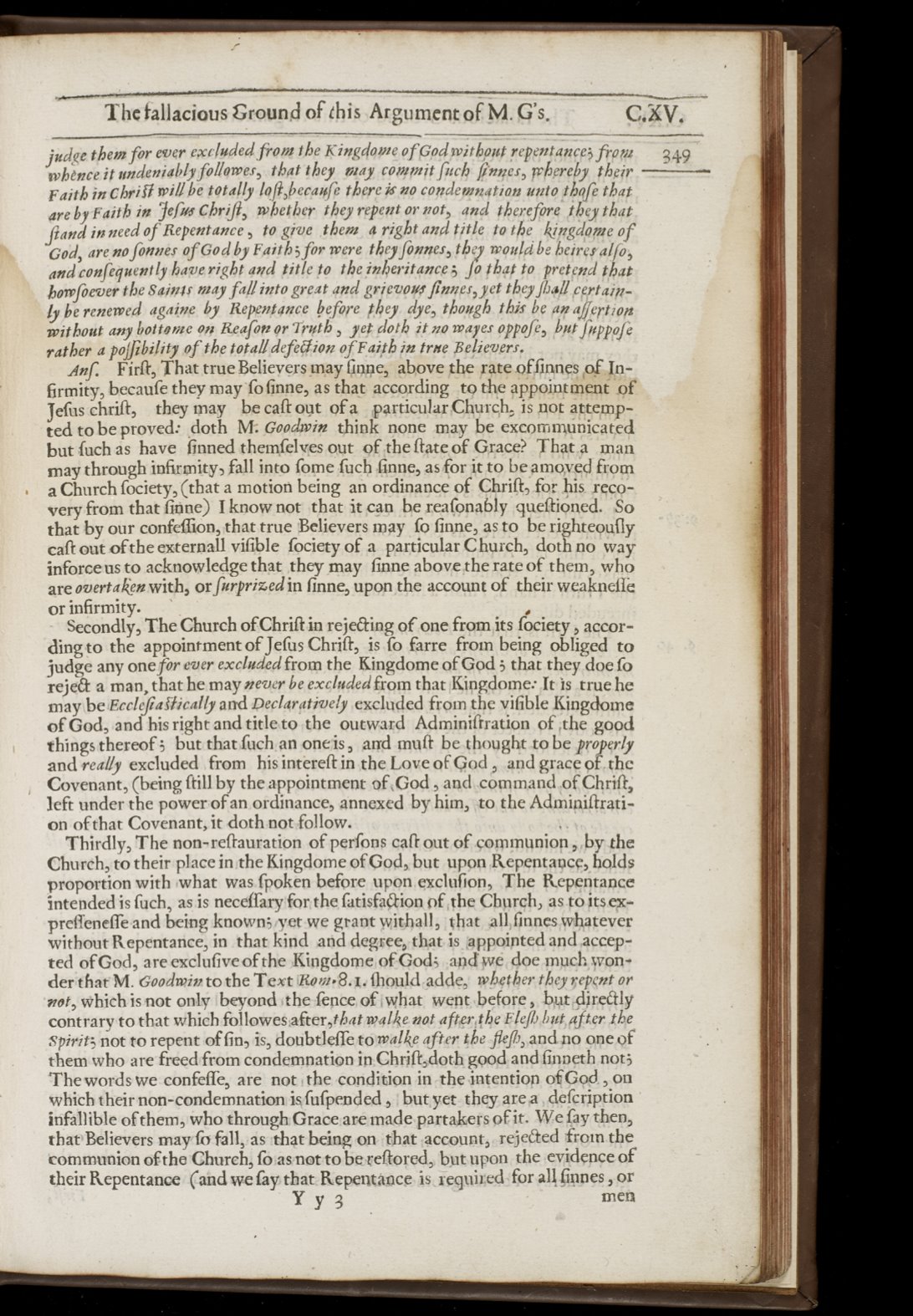

The
fallacious
around of
this Argument
of
M.
G's.
judge
them
for
ever
excluded from the Kingdome ofGod without repentance
from
whence
it
undeniably follower,
that
they may commit filch
[inner,
whereby
their
Faith
inChri.fl
will
be
totally
lofl',becaufe
there
is no
condemnation unto
thole
that
are
by
Faith
in
f
efus
Chrifi, whether
they repent or
not,
and
therefore
they
that
f
and in
need
of
Repentance ,
to
give them
a
right
anel
title
to
the
kngdome
of
God, are no
fonnes
of
God
by
Faith;for
were they
fonnes,
they
would
be
heirerralfò,
and
confequently have
righ
t
and title
to
the
inheritance; fo that
to
pretend
that
howfoever
the
Saints
may,
fall
into
great and
grievousfinites,
yet
they
All/
.certain-
ly be
renewed againe
by
Repentance before
they
dye, though
this
be
an
a
ertion
without
any
bottame on Reafon or
Triith ,
yet
cloth
it
no wayes
oppofe,
but
fuppofe
rather
a
po' ibility
of
the
total
defetíion
of
Faith in
true
Believers.
Anf.
Ffrft,
That true
Believers
may
finne,
above
the rate
Offinnes
of
In-
firmity, becaufe they may
finne, as
that
according
to
the appointment
of
Jefus
chriff, they may be
caft
out
ofa
particular Church,
is
not attemp-
ted to be
proved:
doth
M.
Goodwin
think none
may
be excommunicated
but
fuch
as
have
finned themfelves
out
of
the ftate
of
Grace?
That
a
man
may through infirmity, fall into
Tome
fuch finne,
as
for it
to
be amoved
from
a Church fociety,
(that
a
motion being
an
ordinance
of
Chriff, for his
reco-
very from
that
finne) I
know not
that it
can be reafonably queftioned.
So
that
by
our
confef
ion,
that true
Believers may
fo
finne,
as
to berighteoully
cat
out
of
the externall
vifible fociety
of
a
particular
Church, doth
no way
inforce
us
to
acknowledge
that
they
may
finne
above
the
rate
of
them,
who
are
overtaken
with,
or
furprized
in finne,
upon
the
account
of
their
weaknefle
or
infirmity.
Secondly,
The
Church ofChrift
in reje&ing
of
one from
its
fociety, accor-
ding to the appointment
of
Jefus Chriff,
is
fo
farre from
being obliged
to
judge
any
one
for
ever excluded
from
the
Kingdome
of
God
;
that
they doe
fo
reje&
a
man,
that
hemay
never
be
excluded
from
that
Kingdome: It
is
true he
may
be
Ecclefiallically
and
Declaratively
excluded from the vifible Kingdome
of
God,
and
his
right
and
title to the outward
Adminifrration
of
the good
things
thereof;
but that
fuch
an one
is,
and
muff
be thought
to
be
properly
and
really
excluded from
his
intereft
in
the
Love
of
God
,
and grace
of
the
Covenant,
(being
ftill
by
the appointment
of
,God
,
and command
of
Chriff,
left under
the power
of
an
ordinance, annexed
by him,
to the Adminifirati-
on
of
that
Covenant, it
cloth
not
follow.
Thirdly, The
non-reftauration
of
perlons caft
out
of
communion
,
by the
Church, to their
place
in
the
Kingdome
of
God, but
upon Repentance, holds
proportion with what
was
fpoken before upon exclufion,
The
Repentance
intended
is
fuch,
as
is
neceffary
for the fatisfakion
of
the Church,
as
to
its
ex-
preffeneffe
and being known;, yet
we
grant
withal!,
that
all
finnes
whatever
without Repentance,
in
that
kind and degree, that
is
appointed
and accep-
ted
of
God,
are
exclufive
of
the Kingdome
of
God; and
we
doe
much
won-
der that
M.
Goodwin
to
the
Text
Konz.8.
r. fhould adde,
whether
they
repent
or
not, which
is
not
only beyond
the
fence
of,
what went
before, but
direly
contrary
to that
which
followes:after,that
walhe not
after,the
Elefh
but eifter the
spirit; not to repent of
fin,
is,
doubtleffe to
walke
after
the
fief/3,
and
no
one
of
them
who are freed from
condemnation
in
Chrift,doth
good and finneth not
The
words
we confeflè,
are not the condition
in
the intention ofGod
,
on
which
their
non
-
condemnation
is.
fufpended
,
but
yet they are
a
defcription
infallible
ofthem,
who through Grace are made partakers
of
it.
We
fay
then,
that
Believers
may fo fall,
as
that
being on
that
account, rejected from
the
communion
of
the
Church,
fo
as
not to be
reffored,
but
upon
the
evidence
of
their Repentance
(and
we
fay
that
Repentance
is
required
for
all
finnes,
or
Y
y
3
men
349










